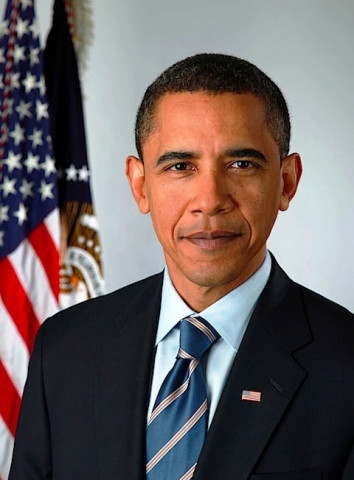Nearly 60 years ago, Dwight D. Eisenhower, the first American president to set foot in India, described America's priorities in the region by saying that while the American relationship with India was one of the head, the one with Pakistan was one of the heart.
Today however, things have changed drastically.
Concluding a recent visit to India, the current Secretary of State Hillary Clinton emphasised that the American relationship with India is one of head and heart.
America’s relationship with the two countries has ebbed and flowed with changing American interests in the region.
Richard Nixon was the second American president to visit India and Pakistan. Nixon famously sided with Pakistan before the 1971 war and even though his regime blamed Pakistan for initiating the ‘71 fiasco, India was given a huge chunk of responsibility and over all Nixon favoured Pakistan all through his term.
The next American president to visit India was Jimmy Carter. He didn’t visit Pakistan in protest of Zulfiqar Ali Bhutto’s judicial murder, but India didn’t fare very highly on his scale, either. He was publicly heard telling an aide that a "cold and blunt message" should be given to the Indians over their nuclear ambitions.
The reason for the United States’ obvious preference of Pakistan during these years was the ongoing Cold War with Russia. While Pakistan was siding with the United States, India considered Russia an ally against possible Chinese aggression.
But of course, the American love for Pakistan lasted only until the USSR dissolved and American goodwill disappeared with their need for a strategic ally in the region. Pakistan was left to deal with the monsters they created and by the time a fourth American president came to visit, affection for Pakistan had long fizzled out.
In 2000, Bill Clinton enjoyed a five day trip to India, while Pakistan stewed in jealousy. In the end, Clinton did fly to Islamabad for a mere five hours and classically snubbed our martial law administrator, General Musharraf.
Now, President Obama is ready to embark on a trip to India and feeling utterly ignored, the political, diplomatic and journalistic circles in Pakistan are constantly analysing the possible reasons and consequences of this so called discrimination.
We, the Pakistanis, have always had a peculiar hang up when it comes to our midnight twin.
Even though India was, is and remains a much bigger power than Pakistan, we do not just draw comparisons in each and every field, but somehow also expect the rest of the world to cater to our whims and strike a balance in relations with India and Pakistan.
Thus, President Obama's upcoming visit to India has stuck like a thorn in our throats and a lot of noise is being made over America's apparent inclination towards India.
Tough luck, but the inclination has been intact for a while and from the way things are, there isn't much chance of the United States easing out of that economically beneficial relationship for the sake of Pakistan.
Yes, Pakistan is an important strategic ally, but the importance of India as an economic ally cannot be denied. With China fast moving towards becoming a superpower, the American government obviously sees a strategic partner in India as well.
So, instead of throwing tantrums over preferential or discriminatory treatment, our foreign policy experts should be seriously analysing Pakistan's options in post American evacuation scenario.
The future of Obama's administration more or less depends on how the Afghan adventure winds up. As American people repeatedly question the wisdom of spending more than 100 billion dollars annually in Afghanistan, the American government must be looking for a graceful way out. And this is where Pakistan comes in.
Without our prolonged support, the US pull out could turn out to be a huge disaster. And yet, constant badgering for money and aid does not equal the kind of support the US needs and expects.
The start of strategic dialogues, the multi-billion dollar civil aid via proper legislation and the recent effort to 'win hearts and minds' of Pakistani people proves that this time, the US is willing to invest in a long-term stable relationship.
But this relationship cannot be one of partners, if all we do is beg, cry and swindle.
Yes, the military operations in tribal areas have served the American cause to an extent, but they were equally necessary for Pakistan's own stability. We have attacked and sacrificed in the name of counter terrorism, but so far our government and administration has failed to take up any steps to eradicate the deep sown seeds of fundamentalism.
Despite the massive loss of life in terrorist attacks, Pakistanis are increasingly turning more and more towards fundamentalist Islam and a huge number still put a lot of faith in the radical forces. Proven or not, it is a well known fact that at least a faction of our intelligence agencies support and help banned outfits to further their own interests.
The rulers continue to play a double game; verbally condemning the drone attacks to gain public favor, while privately signing deals to compromise Pakistan's sovereignty even further. The right wing Jamaats constantly sponsor 'Go America Go' rallies, but remain a part of the very government they accuse of promoting American interests.
In these conditions, can we really expect the US to play its cards in our favour?
Pakistan is rightly worried about the growing Indian influence in Afghanistan and what it would mean after Nato forces have pulled out. But instead of looking towards America to ensure us that we, not India, will be favoured in the region, we have to start playing our own cards right.
The United States in the past has used and discarded Pakistan as and when needed.
However, as even a beginner level student of international relations could tell you, there are no permanent friends or enemies in international affairs, only permanent interests. Our ruling elite must have always known this fact.
So why cry foul when the rules of the game clearly make us the sole protector of our own rights?
America loves us, America loves us not
Why are we angered by Obama's visit to India? Foreign policy isn't about making friends it's about mutual benefits.



COMMENTS
Comments are moderated and generally will be posted if they are on-topic and not abusive.
For more information, please see our Comments FAQ